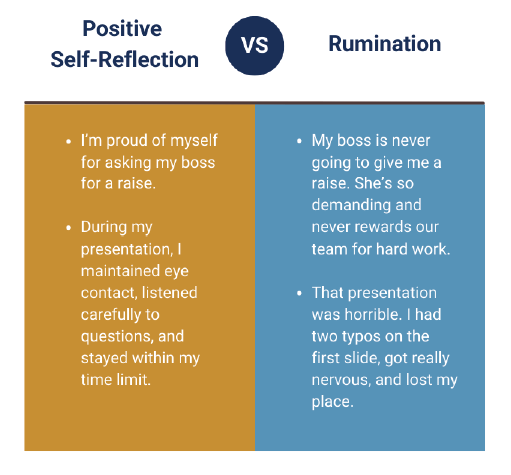Reflect, Don’t Ruminate: 10 Journaling Prompts to Help You Flourish
1996. That’s when Brad, one of the exemplary leaders we interviewed for our research, began journaling. His wife was pregnant with their first child and he wanted to capture his thoughts and dreams so that he had a record of what he was thinking in that season. Over time, his journaling practice evolved and extended to his professional life. He regularly began writing about his experiences: “How I reacted, how I wish I would have reacted, and what I learned from it,” he shared. He calls his process reflection journaling.
Reflection can actually contribute to our well-being and help us flourish, but not when it crosses the line into rumination.
It’s no secret that reflection is critical to learning and growth. But not all reflection is created equal. Reflection is the act of examining our thoughts, feelings, actions, and experiences. Positive self-reflection is reflection done with a positive, hopeful, or growth-oriented outlook. Reflection can actually contribute to our well-being and help us flourish, but not when it crosses the line into rumination. Rumination is “getting stuck in continuous worrisome thoughts and circular thinking about a situation.” It’s when we stew on the negative. Researchers have found that it’s positive self-reflection, not rumination that contributes to our well-being. In fact, rumination can actually have some harmful effects such as depression and anxiety.
The table below offers some examples of positive self-reflection and rumination in the context of work and leadership.

10 Journaling Prompts to Promote Positive Self-Reflection
If you’d like to follow in Brad’s footsteps and begin a regular habit of writing in a reflection journal, here are ten prompts to get you started on a positive trajectory.
- What recent accomplishment am I most proud of and why?
- What three things am I most grateful for today and why?
- When did I experience joy at work today?
- What are three qualities that make me a good leader?
- What are three core values I would like to demonstrate in my work and leadership and how can I begin to put them into practice?
- What are two ways I have grown as a leader over the past year?
- Who has inspired me to become a better leader? What are one or two important lessons I’ve learned from them?
- Who are three people to whom I can turn for encouragement and support when I’m struggling in my work and leadership? How can I encourage and support each of them this week?
- Where did I notice beauty, truth, and goodness at work today?
- Where did I sense God’s presence and love at work today?
We can respond to some of these prompts in a few words or a couple of sentences. And that’s a wonderful place to start if we’re new to journaling. But we can always write more. Maybe if we’re starting out, we set a goal of writing 2 sentences. Then we set a timer and write for 5 minutes. The goal is to engage in reflection regularly as a means to pursue flourishing.
A Few Journals to Get You Started
Remember, you don’t have to have a fancy journal to get the benefits. Of course, you’re welcome to get a Moleskine notebook or sneak into your kid’s school bookfair to get a diary that comes with a lock and key. I’m a big proponent of putting pen to paper because of the mind-body connection and learning benefits of handwriting in a journal, but I’ll offer a couple of digital options.
- Notetaking app. Use a note-taking app on your phone to jot down your thoughts. Be sure to add a date stamp so you can keep track of your entries.
- Journaling app. There are several journaling apps available. You might check out Day One or Penzu.
- A notebook. It doesn’t have to be fancy. Next time you’re at Target, grab a composition book or spiral notebook. You can decorate it with stickers if you’d like. I used to glue scrapbooking paper on the cover of my notebooks to make them feel special.
- A journal. If you’re picky about your paper and whether or not it’s blank or has dots, lines, or a grid pattern, you may want to try Paperage’s journals. (I gave you the link to the dotted one. Now you know my preference!)
- A hybrid. If you want the benefits of writing by hand but want to keep digital records, you might like Rocketbook notebooks or writing with a stylus on a tablet.
Regardless of how you choose to journal, I hope you reap the rewards of some intentional positive, self-reflection!

Meryl Herr
Consultant
Dr. Meryl Herr (PhD, Trinity Evangelical Divinity School) is the owner of The GoodWorks Group LLC, a consulting firm specializing in educational program planning and evaluation. She previously served as director of research and resources at Fuller Seminary’s Max De Pree Center for Leader...


